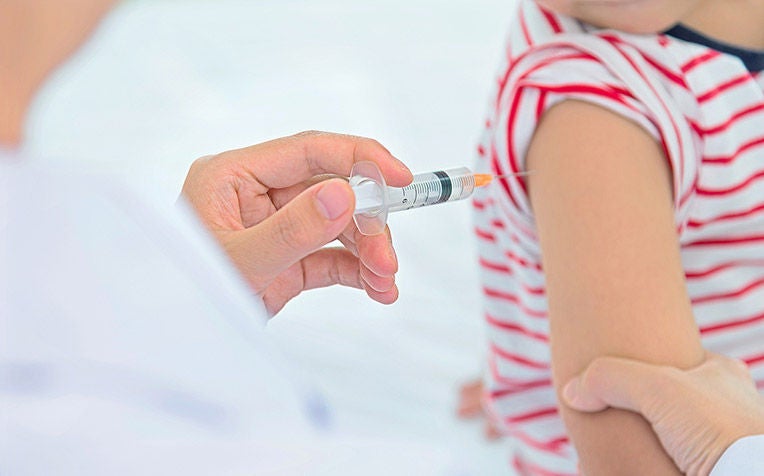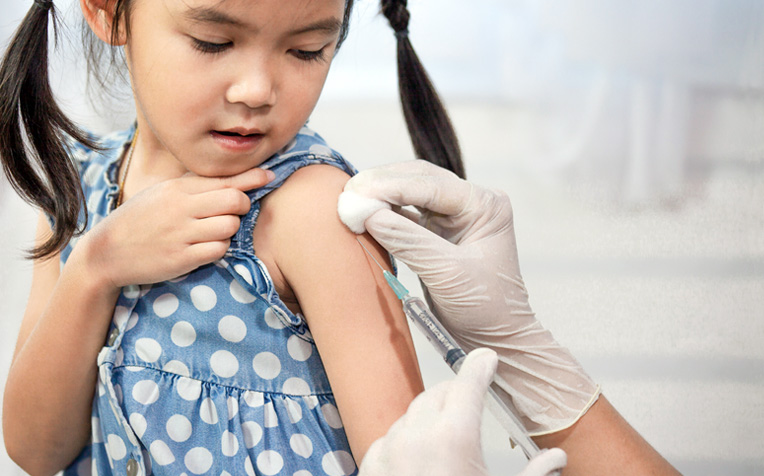|
At 15 Months (1 Year 3 Months Old) | The recommended national immunisation schedule
Measles, mumps, and rubella vaccine (MMR) – 2nd dose (Second dose of MMR can be given between 15-18 months
Human Papillomavirus (Recommended for females 9-26 years)
With combination/additional vaccines can be given between 15-18 months
5-in-1 – booster
Measles, mumps, and rubella vaccine (MMR) – 2nd dose
± Varicella Zoster (VZV) – 2nd dose (can be given as MMRV)
|
| At 16 Months (1 Year 4 Months Old) |
The recommended national immunisation schedule -
Human Papillomavirus (Recommended for females 9-26 years)
With combination/additional vaccines can be given between 15-18 months -
5-in-1 – booster
-
Measles, mumps, and rubella vaccine (MMR) – 2nd dose
-
± Varicella Zoster (VZV) – 2nd dose (can be given as MMRV)
|
| At 17 Months (1 Year 5 Months Old) |
The recommended national immunisation schedule -
Human Papillomavirus (Recommended for females 9-26 years)
With combination/additional vaccines can be given between 15-18 months -
5-in-1 – booster Measles, mumps, and rubella vaccine (MMR) – 2nd dose
-
± Varicella Zoster (VZV) – 2nd dose (can be given as MMRV)
|
|
At 18 Months (1 Year 6 Months Old) | The recommended national immunisation schedule -
Paediatric diphtheria and tetanus toxoids and acellular pertussis vaccine (DTaP) – 1st booster
-
Inactivated polio vaccine (IPV) – 1st booster
-
Haemophilus influenza type b vaccine (Hib) – 1st booster
-
Measles, mumps, and rubella vaccine (MMR) – 2nd dose (Second dose of MMR can be given between 15-18 months)
-
Human Papillomavirus (Recommended for females 9-26 years)
With combination/additional vaccines can be given between 15-18 months -
5-in-1 – booster
-
Measles, mumps, and rubella vaccine (MMR) – 2nd dose
-
± Varicella Zoster (VZV) – 2nd dose (can be given as MMRV)
-
± Hepatitis A vaccine (Hep A) – 2nd dose (six months from first dose)
|
| At 19 Months (1 Year 7 Months Old) | The recommended national immunisation schedule -
Human Papillomavirus (Recommended for females 9-26 years)
With combination/additional vaccines can be given between 18-21 months -
± Hepatitis A vaccine (Hep A) – 2nd dose (six months from first dose)
|
| At 20 Months (1 Year 8 Months Old) | The recommended national immunisation schedule -
Human Papillomavirus (Recommended for females 9-26 years)
With combination/additional vaccines can be given between 18-21 months -
± Hepatitis A vaccine (Hep A) – 2nd dose (six months from first dose)
|
| At 21 Months (1 Year 9 Months Old) | The recommended national immunisation schedule
With combination/additional vaccines can be given between 18-21 months |
| At 6 to 7 Years Old | The recommended national immunisation schedule -
Human Papillomavirus (Recommended for females 9-26 years)
With combination/additional vaccines -
Bacillus Calmette-Guerin
-
Hepatitis B vaccine – 1st dose
|
|
At 10 to 11 Years Old | The recommended national immunisation schedule -
Tetanus toxoid, reduced diphtheria toxoid and acellular pertussis vaccine (Tdap) – 2nd booster
-
Oral polio vaccine (OPV) – 2nd booster
-
Human Papillomavirus (Recommended for females 9-26 years)
With combination/additional vaccines can be given between 10-11 years -
Tetanus toxoid, reduced diphtheria toxoid and acellular pertussis vaccine (Tdap)
-
Oral polio vaccine (OPV)/ Inactivated polio vaccine (IPV) – 2nd booster
-
Human papilloma virus (HPV) – 3 doses (0, 1, 6 or 0, 2, 6 month schedule depending on brand)
|
Ref: M19
Check out our other
vaccination articles:
Childhood Vaccinations: What You Need to Know
Hepatitis in Children: Vaccination is Key
Children's Vaccines: Myths and Facts
Measles: MMR Vaccine is Best Prevention
Pneumococcal Disease: A Vaccine-Preventable Condition
Why the Elderly Need Vaccinations
The Truth About Vaccines



















 Get it on Google Play
Get it on Google Play